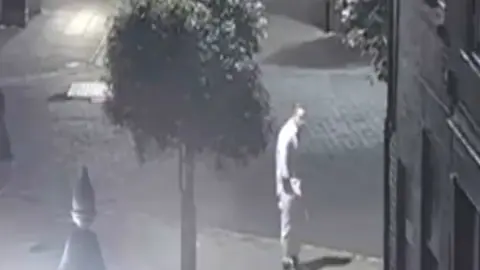Corrie Mckeague 'would have been crushed in bin lorry' - inquest
 Family photo
Family photoRAF gunner Corrie Mckeague "probably wouldn't have known much about it" if he died while asleep in a bin which was tipped into the back of a waste lorry, an inquest heard.
The airman, from Dunfermline, Fife, vanished in Bury St Edmunds, Suffolk, after a night out in September 2016.
Police believe he climbed into a waste bin, but his body has never been found.
A pathologist told an inquest a medical cause of death of "unascertained" could be recorded when there was no body.
Mr Mckeague, who was based at RAF Honington, was last seen on CCTV going into a bin loading area behind some shops in Bury St Edmunds town centre in the early hours of the morning.
 Suffolk Constabulary
Suffolk ConstabularyDr Nat Cary, consultant forensic pathologist, told Suffolk Coroner's Court in Ipswich that if Mr Mckeague ended up in the back of a bin lorry, the "most obvious" cause of death would be crushing.
He said: "That refuse lorry is designed to crush and compress refuse.
"If an individual came into the chamber then crushing would be a likely possibility.
"Over and above that, multiple injuries - head injuries, injuries to the limbs."
 Laurence Cawley/BBC
Laurence Cawley/BBCDr Cary suggested a possible cause of death was compression asphyxia in association with multiple injuries.
He said it was "hard to think that someone could survive" if they were tipped into the back of a bin lorry.
"I should probably say, he probably wouldn't have known much about it if that's what happened," he added.
Asked how quickly a person may fall unconscious, Dr Cary said it depended on the "level of compression".
"But given the levels of force involved in this lorry I would expect unconsciousness would occur quite rapidly within a few minutes," he added.
The inquest, being heard with a jury, continues.

Find BBC News: East of England on Facebook, Instagram and Twitter. If you have a story suggestion email [email protected]
